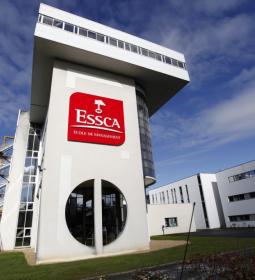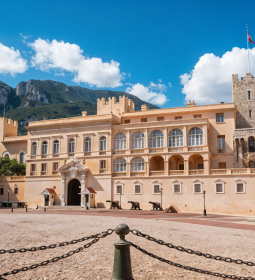Best universities focused on studying archaeology in Canada according to QS World University Rankings offer undergraduate and graduate courses for international students. Archaeology is the study of human culture and history by studying material remains, including the remains of people, animals (fossils), food residues, buildings, human artifacts – tools, ceramics and jewelry.

Students in Canada explore a variety of topics related to humanity:
- Formation of an archaeological site
- Physical, natural sciences
- Ancient cultures
- Geographic Information Systems (GIS)
- Human evolution.
If you are inquisitive, love to work outdoors, get acquainted with different cultures, the program "Archaeology" is for you.
Career options:
- Archaeologist (geoarchaeologist)
- Field archaeologist
- Paleontologist
- Curator of Archaeology
- Laboratory assistant
- Climatologist
- Land Use Analyst.
The duration of bachelor's programs with the study of archaeology in Canada is 3 years, the bachelor's course with honors is 4 years, the master's degree is 2 years.
Best archaeology universities in Canada 2026 - QS World University rankings
| 1 | University of British Columbia |
| 2 | University of Toronto |
| 3 | Simon Fraser University |
| 4 | McGill University |
| 5 | University of Alberta |
| 6 | University of Calgary |
| 7 | Université Laval |
| 8 | Queen's University at Kingston |
| 9 | Montreal University |
| 10 | Western University |
1. University of British Columbia
UBC is a leading and authoritative public university, holding high positions in the field of education, research and innovation. It has two offices: in Vancouver and Okanagan. UBC actively cooperates with other educational institutions, government agencies and non-profit organizations. In 2023, it admitted 15,779 students, with a total number of students 71,201. UBC actively participates in international university rankings, including the Times Higher Education World University Rankings, the Shanghai Academic Ranking of World Universities and the QS World University Rankings.
The University is proud of its contribution to the development of key priority areas, including equality, diversity and inclusivity, reconciliation with indigenous peoples and the fight against climate change. UBC researchers are making significant contributions to the development of biomedical innovations, in particular, the creation of universal organs for transplantation, which can improve equity in the distribution of organs and reduce mortality among patients awaiting transplantation. In the field of artificial intelligence, UBC researchers also occupy a leading position, developing basic algorithms, which underlie machine learning, natural language and image processing. This helps transform medical diagnosis and treatment, make difficult decisions easier, and determine which data can be trusted.
2. University of Toronto
U of T is known as Canada's leading university, featured by its commitment to innovation and transformation of society. All teachers, students, graduates and supporters of U of T regularly make a significant contribution to the development of each of the spheres of society and disciplines within the university. The University has three campuses: St. George, Scarborough and Mississauga, offering a wide range of bachelor's and master's degrees programs — about 700 and 200 in total, respectively.
In the QS ranking for 2022, the university took the second place in the world in terms of sustainable development and the first place in Canada. According to the citation of scientific research, the university ranks fifth in the world (according to the IncitesTM rating), and according to the results of scientific works, it ranked sixth in the world, according to the National Ranking of Universities in Taiwan. Graduates have a high rate of employment, which is confirmed by the 11th place in the world in this indicator (according to Times Higher Education). U of T ranks first among the country's universities in terms of the number of research startups, and actively cooperates with more than 1,000 research institutions around the world.
3. Simon Fraser University
It is one of Canada's leading research educational institutions, which is considered a world leader in research, knowledge development and sustainable development. SFU's academic culture is enriched through in-depth research and strong partnerships. Educators drive scientific discovery, social innovation, and create solutions, fostering a more innovative, inclusive, and sustainable economy in British Columbia and around the world. Scholarships and innovative projects transform the world thanks to partnerships and initiatives with academic institutions and global organizations.
More than 40% of the teachers have international experience. SFU's culture supports the striving for academic excellence and innovation by offering diverse programs in eight faculties equipped with the necessary equipment for academic discovery, skill development and choosing a unique career path. Students at SFU are offered a wide range of local and international field schools, exchange programs, undergraduate research awards, volunteering, and leadership preparation courses.
4. McGill University
In the center of Montreal, towering on the slope of Mount Royal, there is a university that has long been famous in the world academic arena. The university's impeccable reputation attracts foreign students from more than 150 countries (accounting for more than a third of the total number of students), turning it into a truly international oasis of knowledge among research universities in Canada. The university's globally recognized programs nurture outstanding scientists: here, for the first time, the nature of radioactivity was revealed, which was awarded the Nobel Prize, artificial blood cells and plexiglass were created. Today, the brilliant minds of the university are passionate about innovative research in the field of epigenetics, the search for alternative energy sources in cultivated plants.
Covering more than 300 specializations, the university offers a wide range of educational programs at six faculties: arts, natural sciences, medicine, education, engineering and management. The university's Alumni Hall of Fame is famous for hundreds of names, their achievements and successes serve as evidence of the university's outstanding contribution: 12 Nobel laureates, 159 Laurent fellows, 18 billionaires, two former prime ministers of Canada, two governors-General and 15 judges of the Supreme Court of Canada. In addition to these academic honors, university graduates have received 9 Academy Awards, 13 Grammy Awards, 13 Emmy Awards and 4 Pulitzer Prizes. The main campus of the university is located in the center of Montreal, the second campus is located in Sainte-Anne-de-Bellevue, on the island of Montreal, just 30 km west of the main territory.
5. University of Alberta
It is one of leading educational institutions in Canada, which is known for its achievements in the fields of humanities, arts, business, engineering and healthcare. The university offers more than 200 bachelor's degree courses, over 500 master's and doctoral degree programs, which are available on five campuses in two cities. The University has created a stimulating educational environment, allowing students to immerse in new culture, disseminate and apply new knowledge through study, self-education, scientific and creative research, interaction with society and partners. Alberta actively innovates at the local, national and international levels, making a significant contribution to the development of Canada.
The University is one of the four leading research universities in Canada, with 91 research groups and more than 120 active projects. Students can join 425 student organizations, which help them carry out their diverse initiatives. Also students can study at partner educational institutions around the world, including 23 leading research organizations. Alberta graduates are ranked second in the country in terms of employment rate, indicating the high efficiency of internship, recruiting and professional development options offered by the university.
6. University of Calgary
The Canadian University of Entrepreneurship provides an opportunity to easily start a new career, business, development in the pharma industry or acquire new skills. The Bachelor's education offers more than 250 programs, providing advanced laboratories for studying, practical preparation and valuable mentoring opportunities. The Master's degree programs are available in 65 different areas with a focus on entrepreneurship. More than 1,200 courses and seminars, 70 certification programs help professionals adapt to the changing labor market and broaden their horizons. Such courses are relevant, in demand and based on best practices. The University prides itself on retaining 95% of students and providing employment for 94% of graduates. The university is a member of U15 and is considered one of the most prestigious research universities in Canada. Cooperation with the oil industry is carried out through the Department of Land Sciences and the School of Engineering.
The central campus covers an area of 2.13 square kilometers and includes 11 of the 14 faculties, outstanding research centers, modern sports facilities and other services aimed at supporting students, staff and teachers. The Sky Hall campus, opened in 1970, includes an Agricultural Research Center, a Faculty of Clinical Veterinary Medicine, a veterinary science research station, and a wildlife sanctuary. In 2010, a large university library was opened on the campus.
7. Université Laval
Université Laval is a major educational and research university with a global vision, gaining popularity for its preparation of socially oriented leaders. The university is located in one of the oldest cities in North America and is considered the oldest university in the country, and is now actively engaged in research, being on the border between innovation and technological progress. The University offers education in 17 faculties and more than 60 departments, schools and institutes — in total, about 600 training programs are offered in all fields of knowledge. More than 90% of undergraduate programs include mandatory or optional internships, which are usually paid. More than 150 programs are available exclusively in the distance learning format, as well as 2,500 courses. Full-time and distance learning options enrich the student experience by providing the flexibility needed to successfully complete courses regardless of circumstances.
There are four residences on the campus, two of which are designed for students. UL is actively involved in the life of the local community, collaborating with leaders and innovators in the field of research and development. The University is located in the heart of Quebec City, which is listed as a UNESCO World Heritage Site.
8. Queen's University at Kingston
The Research University is located in Kingston, Ontario, owning a large area, including Herstmons Castle in East Sussex, England. The University consists of eight faculties and schools and is a member of the U15 group, uniting Canadian educational institutions conducting intensive research, which includes 24 research centers and institutes. The university is regularly included in QS World University Rankings and Academic Ranking of World Universities. More than 13,500 students study here, and in total, about 1,000 teachers work at all faculties.
Among the graduates are government officials, scientists, business leaders and 57 Rhodes scholars, some Nobel laureates and the winner of the Turing Prize are also associated with the university. The university is located next to the Royal Hospital in Kingston, and is closely connected with the local and regional economy, culture and social life. The university's libraries contain more than two million printed literary publications and four hundred thousand electronic resources. There are 18 student residences on campus.
9. Montreal University
It is the largest French-speaking public research institution where 28% of students are enrolled in doctoral studies, which is one of the highest rates in Canada. Annually, about 11,000 international students gain learning experience here. The university has 2,300 professors and researchers, 2,600 teachers, 500 associate professors and 2,000 clinical professors, consisting of 13 faculties and schools, 2 sponsored educational institutions and 27 medical institutions. It offers 600 studying programs; the university has signed 550 partners in 80 different countries.
The main campus of the university is located on the northern slope of Mount Royal, in the Outremont and Côte-de-Nege districts. In addition to it, the university has five more regional offices in the cities of Terrebonne, Laval, Longueuil, Saint-Giacinthe and Mauricie. The university holds leading positions in various rankings: in the academic ranking for 2022, it positioned 101-150 in the world and sixth in Canada. According to the QS World University Rankings for 2023, the university is ranked 116 in the world ranking and 5th in the national list. In the Times Higher Education and World Report rankings for 2022 and 2023, the university also demonstrated high results in both world and Canadian rankings.
10. Western University
A leading university with active research and an international community aims at changing the modern world. WU provides the opportunity to study with recognized researchers who are authorities in their fields. In the Times Higher Education ranking for 2024, the university occupies one of the top 10 positions in terms of sustainable development indicators. Students have a choice of more than 400 combinations of bachelor's degree programs, 160 master's and doctoral programs. The university has a high student enrollment rate accounting for 91%, which is one of the best in Canada. The retention rate of students in the first and second years is also high, reaching 92%.
The university's scientists are the laureates of 24 Rhodes Scholarships. The educational programs cover 12 faculties, the School of postgraduate education and professional programs in medicine, business, law and engineering. 88 Master's degree programs are available for graduates, including interdisciplinary areas. 92.3% of graduates get a job within six months after graduation.









